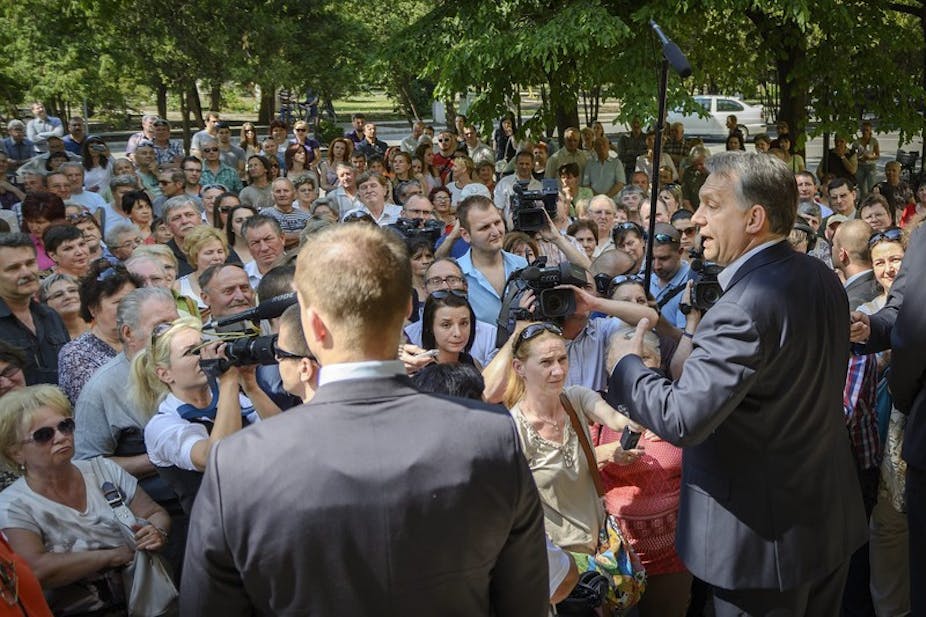Hungary faces a series of elections in 2014. Its European Parliament (EP) elections are to be held on May 25, between the Hungarian parliamentary elections on April 6 and the local elections in October – and it is tempting to think that the EP elections are the least important of the three.
Hungary’s national parliamentary elections seem to mobilise citizens more, and Hungarians turn out for the EP elections at [a rate lower than the EU average](http://www.europarl.europa.eu/aboutparliament/en/000cdcd9d4/Turnout-(1979-2009). EP elections do not seem to be as important for political parties as national elections, and the perception is that being a member of the EP is a detour in a political career, not a step up.
But this year’s EP elections are clearly being taken rather more seriously than they have been before. For instance, even as it may be less immediately pressing, the EP campaign has seen more televised debates than the national parliamentary elections did. No public debate among prime ministerial candidates was held this year, while aside from the debate among the presidential candidates for the European Commission (broadcast in Hungary on channels with low ratings), a televised debate for the Hungarian EP party list leaders was held two days before the vote.
In another sign that EP election dynamics are changing, there are now a few examples of politicians finding a way back into Hungarian politics after serving in the EP. One prominent example is János Áder, the current president.
All in all, eight parties (or party alliances) are participating in the 2014 EP elections: the governing Fidesz-KDNP, the Hungarian Socialist Party (MSZP), Jobbik, Seres Mária Szövetségesei (SMS), The Homeland is Not For Sale Movement, Politics Can Be Different (LMP), Together-Dialogue for Hungary (Együtt-PM) and the Democratic Coalition (DK).
This year’s EP elections hold special significance for both right-wing and left-wing parties. The current governing party alliance, the right-wing Fidesz-KDNP, has a somewhat tense relationship with the EU; a strong victory after the one they earned at the national parliamentary level in April could further strengthen their position.
And while many left-wing parties (MSZP, Együtt, DK, PM and MLP) participated at the national parliamentary elections by way of a joint list, at the EP elections they have separate ones (except for Együtt and PM who run together and for MLP who does not participate). The results will therefore reveal a lot about their relative strengths and popularity.
The Fidesz-KDNP government’s hope of a big win shows every sign of coming true. In a widely cited paper, Simon Hix and Michael Marsh show that the timing of the EP elections within national election cycles matters a lot; when EP elections come hot on the heels of national elections, a “honeymoon effect” boosts the vote shares of governing parties (who otherwise usually suffer a decline).
Forecasts for Hungary support Hix and Marsh’s findings: Fidesz-KDNP is expected to have a higher vote share than at the April national parliamentary elections. However, their result may still be lower than the 56% they won in the 2009 EP elections.
Meanwhile, radical right-wing Jobbik may get the second highest number of votes and the Hungarian Socialist Party the third. Using both a mandate calculator and some of the published polls (by Nézőpont, Ipsos and Tárki), we can predict that Fidesz-KDNP are set to win 13 seats, Jobbik to win four seats, the Hungarian Socialist Party three and LMP one seat in the EP. There is of course some uncertainty in the polling, meaning that Jobbik and the socialists may switch places in this ranking, DK and Együtt-PM may get a seat, and some quite different predictions altogether are being aired – but this remains the expected outcome.
Finally, general trends show that attitudes to the EU in Hungary are similar to the average EU level, with levels of Euroscepticism fluctuating over the years. And based on the most recent polls, 37% of Hungary’s citizens have a positive image of the EU, against the EU average of 34%.
A survey by a Hungarian research institute shows that although there are differences among the supporters of different parties as regards their positive or negative opinions on the EU, as you would expect, Jobbik voters are by far the most negative.

